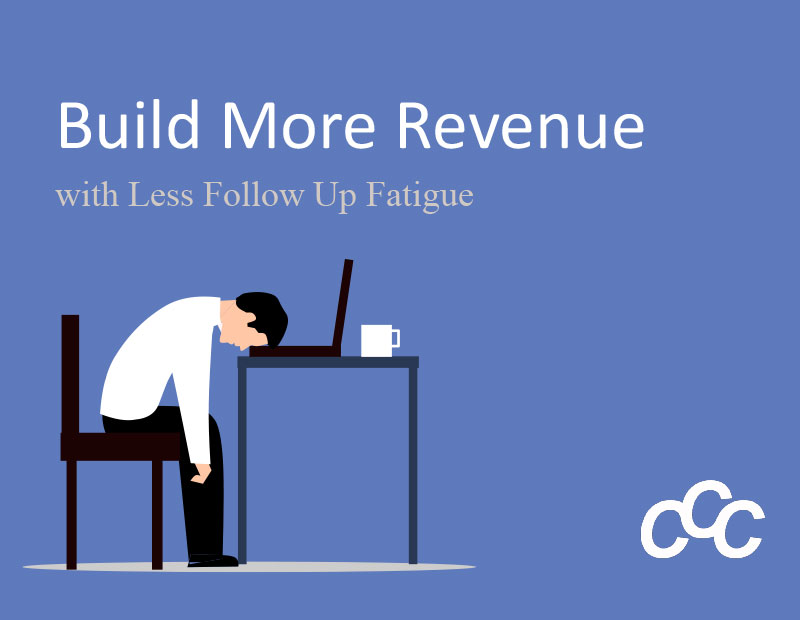Gerald Manes, known as GM, owns a security system installation company and employs 5 salespeople, 10 technicians, and 2 administrators. GM also oversees marketing and sales. Over 2 years ago, he decided to implement a CRM (customer relationship software). He was frustrated with his sales department, and he wanted to make changes to increase sales.
His Company, GMInstall, was profitable and grew in each of its 3 prior years. GM saw that the sales team lost too many sales proposals during the past year and that leads were not identified quickly. GM was at a loss but knew he had to get a much better handle on his future sales. He turned to a friend who introduced GM to a CRM specialist.
I Love My Team But…
GM explained that he loved his team. They worked hard but were not always smart, and to a large part, GM knew it was his fault. The specialist suggested a meeting with the sales and admin teams to get an agreement about the pain points and what to do about them. “To succeed with a CRM, you need to have your team involved upfront,” GM was advised.
The specialist met with the team and GM, talked about their needs, and saw their serious intent. They all agreed about their pain points:
- Spend too much time with the wrong people
- Post-it notes are all over the place and getting lost
- Too many spreadsheets on different devices
- Don’t know who is working with what prospects
- Too many meetings with GM to give updates
They agreed that each pain point was important and prioritized their needs. They set the next steps including what they needed to learn such as what are the best CRMs out there. Very quickly, CRM reviews were completed, and a decision was made. The team was nervous and excited.
“We need a CRM to track our leads and to communicate with each other” shouted a group member. The team applauded GM for asking for their feedback and making them part of the decision-making process. GM set the budget, but the team was involved. No doubt, they were off to a great start as the success of every CRM implementation is dependent on the team’s commitment including the owner or key executive.
Some CRMs are Robust
The specialist helped the team set priorities based on their pain points. They agreed to:
- Assign salespeople to specific networking, industry, and trade groups
- Establish a sales funnel that communicates with prospects automatically
- Send tasks to each salesperson prompting them to follow up with a prospect
- Use the Task Manager to set tasks, by the client with deadlines
- Rate each prospect and spend time with the “As and Bs”
- Segment their contact records to prompt different messaging to different groups
- Measure their results
The CRM was very robust and capable to automate many mundane, repetitive communications and tasks and the specialist had its staff configure the CRM to GMInstall’s requirements. The specialists helped the team capture their ideas and phase them in based on priorities.
The team launched the CRM and, 6 months later, they were all smiles. Their proposal win rate jumped and they put out fewer proposals. Prospect and client notes and tasks were in the CRM and there were no more sticky notes and spreadsheets. Meetings were shorter as everyone communicated through the CRM.
CRMs are Great tools
Here is what the team built using their CRM:
- Sales funnel with 5 stages: Interested, Asked for Quote, Property Review, Quote Sent, Won or lost. At each stage, specific messaging was sent to the prospect
- Lead source tracking to know what new business sources are effective and who is working on what
- Central contact record where the salesperson moves a prospect through the sales funnel and retains relevant client information
- Task lists by the due date, by the client, and by status (Overdue, Incomplete, Completed)
- Prospect rating on a scale of 1-5 so that salespeople paid attention to their best prospects first
- 3 ways to measure what they were doing: Conversion ratio, # of new contacts, and lead source results
GM now had a full view of what was going on in marketing and sales. He no longer had to bug the team to find out what was going on. The team was on board, and they were underway. His friend’s introduction to the specialist paid off and GM was elated.
GMInstall’s Team is Smart
The sales team met regularly over the 6 months and saw the potential to solve additional pain points. They learned about the power of automation and how to use Dynamic Lists to segment their contacts. They decided to include the technicians and admins and, together, they decided to focus on the installation process first.
What does that have to do with marketing and sales? A CRM’s automation strength can be used to communicate and set tasks once the sale is made so that “who needs to know what” is told when a sale occurs. Today, the install teams, the office, and the accounting departments are notified. Equipment is ordered, received, tested, and installed while being tracked by the CRM.
What were the impacts of using CRM to track customer production? During the next 2 years GMInstall:
- Registered a 30% increase in sales and did not have to add another staff person.
- Shortened the time from when a sale is made to when the installation is completed.
- Fewer calamities as relevant personnel knew when the equipment arrived, was tested, and scheduled for installation
- Increase in the gross profit margin based on lower job costs
What GM and the team learned was that keeping up to date on client work was just like keeping up to date on prospects.
Closing More Sales with Less Follow Up Fatigue
GM was lucky. He had a friend who knew a CRM specialist to guide GM’s process. CRM specialists are few and far between. The specialist made sure that GM got his team to buy in, upfront and become champions for the CRM. Today, the CRM is used by staff in all departments, prospect and job status are up to date, and outreach to the database is segmented and filled with nurturing and educational content.
Have you ever felt like GM felt 2+ years ago before he invested in his Company and in the CRM? If so, we can help.
X2CRM is an enterprise, open-source CRM that we configure to align with your business goals. As a part of our onboarding, we train your company on how to use X2CRM in the way that works best for your business. We show you how to take advantage of X2CRM’s capabilities to sell more efficiently and address business problems. Contact us to request a demo of X2CRM.





